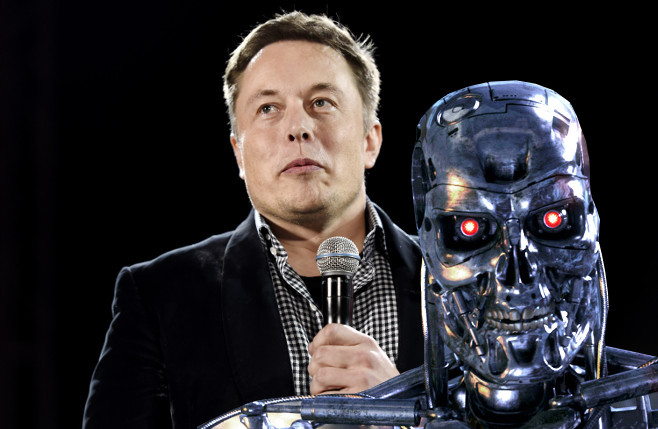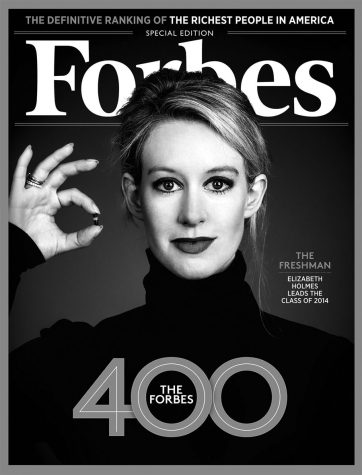Elon Musk vs. The Terminator
If you were asked “what is the greatest threat facing mankind today?”, a likely response would be global warming or climate change. However, there is another issue that might not seem like a serious problem, but poses a great threat to humans. The possibility of free thinking self-aware artificial intelligence (AI) is closer than you might imagine as companies begin production of autonomous cars and humanoid robots.
Artificial intelligence is quickly becoming a reality with companies such as Google DeepMind aiming to produce free self thinking, self-aware robots to be servants to humans. Business tycoon Elon Musk has invested a considerable amount of money into this company in an attempt to safely monitor the development and make sure Terminators don’t become a reality. In an interview Musk stated his investment were “not from the standpoint of actually trying to make any investment return… I like to just keep an eye on what’s going on with artificial intelligence. I think there is potentially a dangerous outcome there. There have been movies about this; you know, like Terminator, there are some scary outcomes. And we should try to make sure the outcomes are good, not bad.” Musk has been very vocal about his fear of artificial intelligence, even saying that it could potentially be more dangerous than nuclear weapons.
Vicarious is another company that Musk has put his money into; the company’s aim is to build a neural network capable of replicating the part of the brain that controls vision, body movement and language. The ultimate goal of company founder Scott Phoenix is to build “a computer that thinks like a human, but doesn’t have to eat or sleep.” Essentially, Musk doesn’t want humanity to build a robot that would be capable of performing genocide of all humans. Musk has actually cited the Terminator series as a perfect example of what he fears could happen if researchers aren’t careful.
Musk along with fellow entrepreneur Sam Altman have even started their own company called OpenAI, a non-profit organization created to keep a watchful eye on companies developing advanced AI like Google and Vicarious. The company has other plans as well, which involve creating its own AI unit, but as Musk put it, “one that does what we want it to do.” They plan on maximizing the usefulness of the AI and then marketing it to corporations. When asked if freely sharing this AI could possibly “empower bad actors, if they would end up giving state-of-the-art AI to the Dr. Evils of the world,” the two said they “believe the needs of the many will outweigh the needs of the few.” Altman continued by saying “Just like humans protect against Dr. Evil by the fact that most humans are good, and the collective force of humanity can contain the bad elements, we think it’s far more likely that many, many AIs, will work to stop the occasional bad actors.”
Even though the possibilities of a superhuman AI taking over the world are slim, and most likely will not happen within the foreseeable future, Musk believes that the company will thrive. He is seeing to this by pulling top AI researchers from companies like Google and employing them at OpenAI. By doing so, he is getting access to data and ideas he previously couldn’t. If OpenAI stays true to its original purpose, it can use that data as a power check on powerful corporations like Google and Facebook (both of which have invested billions into AI research).
So while the chances of terminators coming to destroy us is very scarce, it is good to know that there are the few individuals that are thinking ahead and taking into account the disastrous possible outcomes of superhuman AI.
Works Cited:
Mets, Cade. “Elon Musk’s Billion-Dollar AI Plan Is About Far More Than Saving the World.” Wired.com. Conde Nast Digital, 15 Dec. 2015. Web. 10 Mar. 2016.
Hern, Alex. “Elon Musk Says He Invested in DeepMind over ‘Terminator’ Fears.” The Guardian. Guardian News and Media, 18 June 2014. Web. 10 Mar. 2016.
Mack, Eric. “Elon Musk, Silicon Valley Elite Launch ‘Open’ Artificial Intelligence With $1 Billion.” Forbes. Forbes Magazine, 11 Dec. 15. Web. 10 Mar. 2016.

Hi my name is Kevin Lentz, I am in 10th Grade and am 15 years old. I am a writer for the newspaper and like to write about STEM topics. My favorite font...











Haoran Zhu • Feb 28, 2017 at 5:02 pm
Kevin, biased though I may be, this is the best article I ever read on Wildezine. You have a catchy title and image. The content of it is mostly concrete facts. I really recommend start a whole new section of Business articles/news, where you guys can write about new innovations in the business world. I think it will draw much more attention and interests. Talking about Artificial Intelligence, Elon Musk is a great entrepreneur shaping our world. I believe innovations is the key for humans to progress. In Financial Innovation Analytics, we are currently talking about thematic investing and how disruptions of the economy can really influence the way of investment. Artificial intelligence is one of hottest topic we looked at. A great thing about entrepreneurs nowadays is having the vision to solve problems. For example, electric cars are something never heard of in the 20th century, now they are booming around the globe. I totally agree with your quote “the needs of the many will outweigh the needs of the few.” If Artificial Intelligence do create problems, there always will be something else invented or created to solve them, and creativity has driven the human race forward over centuries.